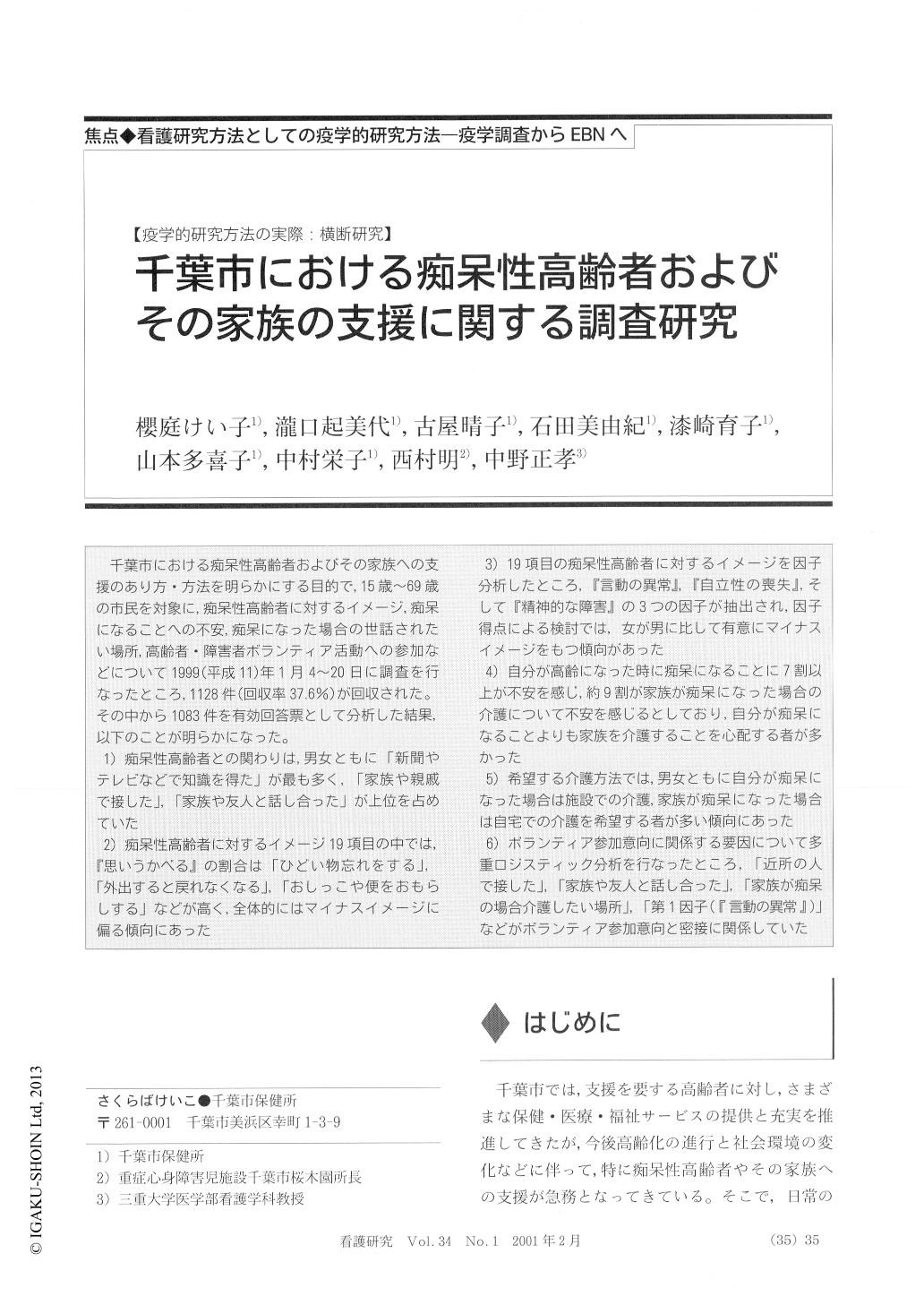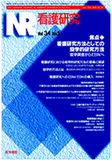Japanese
English
- 有料閲覧
- Abstract 文献概要
- 1ページ目 Look Inside
- サイト内被引用 Cited by
千葉市における痴呆性高齢者およびその家族への支援のあり方・方法を明らかにする目的で,15歳〜69歳の市民を対象に,痴呆性高齢者に対するイメージ,痴呆になることへの不安,痴呆になった場合の世話されたい場所,高齢者・障害者ボランティア活動への参加などについて1999(平成11)年1月4〜20日に調査を行なったところ,1128件(回収率37.6%)が回収された。その中から1083件を有効回答票として分析した結果,以下のことが明らかになった。
1)痴呆性高齢者との関わりは,男女ともに「新聞やテレビなどで知識を得た」が最も多く,「家族や親戚で接した」,「家族や友人と話し合った」が上位を占めていた
2)痴呆性高齢者に対するイメージ19項目の中では,『思いうかべる』の割合は「ひどい物忘れをする」,「外出すると戻れなくなる」,「おしっこや便をおもらしする」などが高く,全体的にはマイナスイメージに偏る傾向にあった
3)19項目の痴呆性高齢者に対するイメージを因子分析したところ,『言動の異常』,『自立性の喪失』,そして『精神的な障害』の3つの因子が抽出され,因子得点による検討では,女が男に比して有意にマイナスイメージをもつ傾向があった
4)自分が高齢になった時に痴呆になることに7割以上が不安を感じ,約9割が家族が痴呆になった場合の介護について不安を感じるとしており,自分が痴呆になることよりも家族を介護することを心配する者が多かった
5)希望する介護方法では,男女ともに自分が痴呆になった場合は施設での介護,家族が痴呆になった場合は自宅での介護を希望する者が多い傾向にあった
6)ボランティア参加意向に関係する要因について多重ロジスティック分析を行なったところ,「近所の人で接した」,「家族や友人と話し合った」,「家族が痴呆の場合介護したい場所」,「第1因子(『言動の異常』)」なとがボランティア参加意向と密接に関係していた
To evaluate methods for supporting demented elderly people and their families, a questionnaire survey was conducted among residents of Chiba City aged 15-69 years from January 4 to 20, 1999 concerning images of demented elderly people, anxiety over becoming demented, places where they want to receive care when they become demented, and intention to participate in voluntary activities for the care of the elderly and demented. Answers were obtained from 1128 (37.6%) of the residents, and those from 1083 residents were analyzed as valid responses. The following results were obtained.
1. Concerning the respondents' direct or indirect contact with the demented elderly, the largest percentages of both male and female respondents “obtained knowledge from newspapers and TV”, and large percentages of the respondents “had a demented member in their families or relatives” and “talked about senile dementia in the family or with friends”.
2. Of the 19 items concerning images of the demented elderly, high percentages of the respondents “imagined” people who “are extremely forgetful”, “cannot come home once they go out”, and “have incontinence of urine and feces”. The contents of their “images” were predominantly negative.
3. Factor analysis of the 19 items of images of the demented elderly revealed 3 factors, i.e. “abnormal speech”, “loss of independence”, and “mental disabilities”, and evaluation of the scores of the factors indicated that females have a significantly stronger tendency to have negative images than males.
4. More than 70% of the respondents were worried about becoming demented when they are aged, and about 90% of the respondents expressed their anxiety over the care of their family members if they become demented. More respondents were worried about the care of their families than about becoming demented themselves.
5. Concerning the desirable style of care, a high percentage of both males and females hoped to be cared at institutions if they themselves become demented but to care their family members at home if they become demented.
6. Multiple logistic regression analysis concerning factors related to the intention to become involved in volunteer activities showed that the intention to work as a volunteer was closely related to “(having) a demented neighbor”, “(having) talked about senile dementia in the family or with friends”, “place where they hoped to care demented family members”, and “the first factor (abnormal speech)”.

Copyright © 2001, Igaku-Shoin Ltd. All rights reserved.


